History Is Written By The Russians
How a nation forged an identity from the Soviet defeat of Nazi Germany.
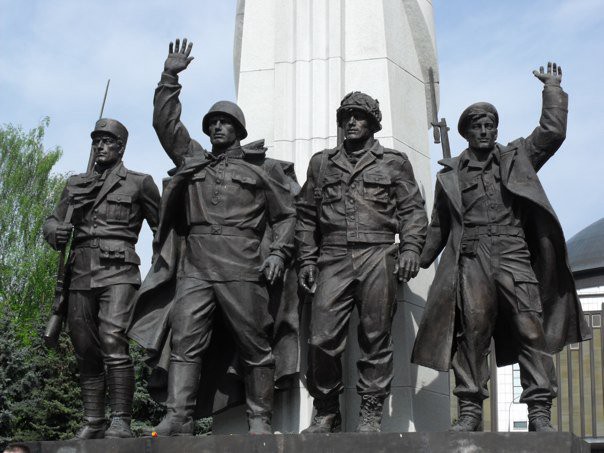
It’s easy to get sick of the word “victory” in Russia — everything is victory this and victory that. A few years ago, on May 9 — what Russians call “Victory Day” — I pushed into a metro car headed to Moscow’s Victory Park. When the doors opened, I was swept to the bank of escalators by hordes of revelers bedecked in costume Red Army uniforms or garish tee shirts that proclaimed “VICTORY!” and “Thank you, grandpa, for our victory,” which rhymes in Russian. To the left, I saw the Victory Arch, and I shoved my way toward it, past groping teenagers and thronging babushkas with their wide-eyed, seraphic grandkids. When I finally broke free, it was into a circle that had opened around five red-cheeked, older men, their shirts unbuttoned in the spring sun, howling the most popular of Victory Day songs, immortalized by crooner Lev Leshchenko and titled, of course, “Victory Day.” This Victory Day, the chorus runs in my painfully literal translation,
The scent of gunpowder still on the air,
Is a celebration
Of those whose hair is already graying,
It’s joy
With tears in our eyes.
Victory Day!
Victory Day!
Victory Day!
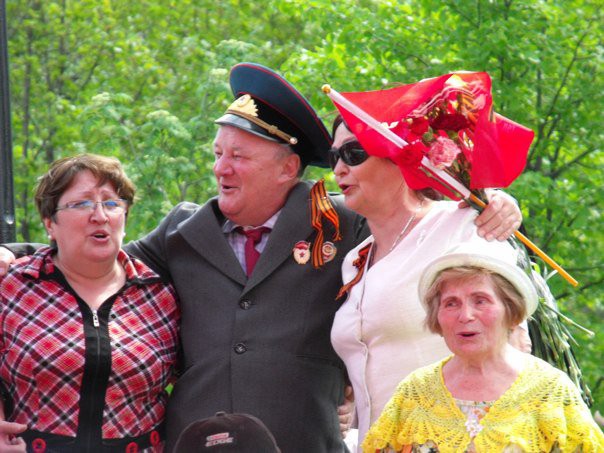
A waifish young woman with a crown of flowers kissed me three times on the cheek in the traditional Russian fashion: left, right, left. One of the men dug up a bottle of vodka from his bag, another produced tiny paper cups, and I found myself, hours later, singing the song again, only this time I was perched on the railing of a downtown Moscow bridge, the Kremlin looming over me and the thousands of people who had come out to celebrate. I think the person next to me had an accordion, and I think my friend Zhenya was holding my hand as we shouted again, “Victory Day! Victory Day! Victory Day!” under the fireworks that bloomed over St. Basil’s Cathedral and Victory Park.
As the sun rose and I felt I might burst with drunken goodwill towards Russia and Russians. I had lived in Russia for three years, from 2005–2006 and again from 2009–2011, which is not so long, but it was long enough to observe the contortions of a nation hell-bent on reclaiming what it sees as its greatness. And that greatness can be boiled down to one word that might even make Donald Trump perk up: “Victory.” But where Trump’s “winning” is intentionally undefined, in Russia there is only one victory that really matters.
This year, Russia will celebrate the 72nd anniversary of the defeat of Nazi Germany. It is hard to overemphasize how important that victory is to Russians. Of all their holidays — and they have a lot — Victory Day is the biggest; it makes our Independence Day festivities look muted, and it is suffused with something more than simple patriotism. As much as Victory Day is about celebration, it is a commemoration of the unspeakable suffering and the sacrifice of a generation of men to save the world from evil. But it is also a reaffirmation of Russia’s national myth. Russian identity in the Putin era, complex as it is, cannot be extricated from victory in World War II. As Vladimir Solovyov, a talk-show host and pundit, wrote in the introduction to his 2009 book, We are Russians! God is With Us!, “[our soldiers] sacrificed for everyone, and they left us with an altogether unique identity, an identity that cannot be shared by the Germans or the Italians or the French — no, not a single other nation on Earth can share it — the identity of victors.”

Russians call the Second World War Velikaya otechestvennaya voina, which is usually translated as “The Great Patriotic War,” but perhaps means closer to “The Great War for the Fatherland.” (Properly, it’s the Second Great War for the Fatherland — the first was the Russian repulsion of Napoleon’s army in 1812.) Using the phrase never felt comfortable for me, because it wasn’t my fatherland, and because I didn’t like the triumphalism implicit in the term. But a person in Russia cannot refer to the war without taking sides. Calling it the “Second World War” broadcasts a conspicuous political correctness that irks many Russians, for whom the war represents their nation’s greatest moment on the world stage. The very neutrality of “World War II” aligns the speaker with all sorts of unsavory characters: Hitler apologists, Holocaust denialists, Stalin critics, and anti-Russia propagandists, all of whom are conflated in the Russian imagination. It was their fatherland, their war, and their victory.
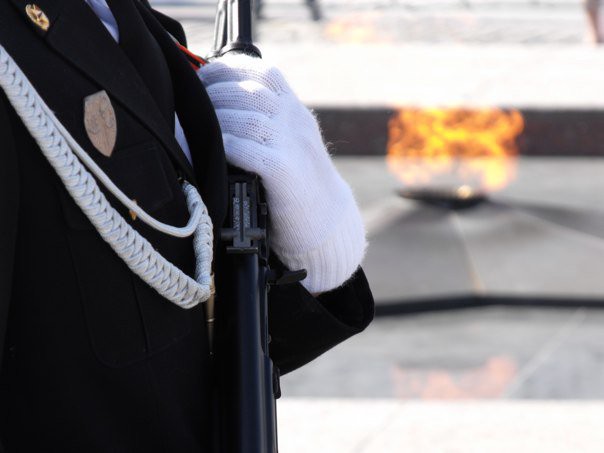
If history is written by the victors, one problem with the Second World War is that the victors instantly became enemies. Russian and American history books are products of the Cold War: we tend to downplay the Soviet war effort, and they nearly ignore ours. The American story was clear: Hitler tricked Stalin, then the Soviet Union threw bodies in front of the Nazis until America came in and bailed them out on D-Day. It might be too much to expect historiography of a fourth-grade class, but this narrative was intended to diminish the importance of the Soviet war effort and aggrandize our own. The narrative in Russia is similarly reductive. In Irkutsk, where I studied abroad in college, I took a speaking-practice class with other foreign students. One day, when we were talking about history, the professor said, “And America entered the Great War for the Fatherland on…,” coaxing us into saying the whole date properly.
“Seventh December, 1941,” we obediently chanted, working through the contortions of pronouncing the year in Russian.
“Sixth June, 1944,” she said simultaneously.
We paused.
“Well, that’s very interesting,” she said, and pursed her lips.
She had heard, vaguely, about Pearl Harbor and America’s war with Japan. It gets mentioned in Russian history books in about the same level of detail that American textbooks describe the Russo-Japanese War. D-Day, to her, was America’s entry into to war, and it was purely opportunistic. Before then, we were mostly getting rich selling guns to England and the U.S.S.R. When the Red Army defeated Hitler’s invasion and began regaining lost territory, America rushed to Europe to counter Stalin, worried that he would take over Europe.
There’s some truth to this story. The prosperity of the 1950s in this country would be unthinkable without the upheaval of the war. Our cities were untouched — even the Pearl Harbor attack spared Honolulu — and the weakening of Europe’s powers was key to our ascent. A stroll through our National World War II Museum in New Orleans reveals that our fascination with the war is mostly with military strategy: battle lines, the minutiae of island-hopping, and the logistics of D-Day. Russian museums of the war are tinged with a bone-deep suffering that America can ignore because we have, thankfully, never had to endure it. We learn little about the blockade of Leningrad, the years of starvation and indiscriminate murder in Ukraine and Belarus, the Einsatzgruppen who followed behind the German Army and slaughtered Soviet civilians or shipped them to concentration camps in Poland.
In America, we also tend to devalue the Soviet role in winning the war. Studying the Eastern Front in the West, we ignore the improvisatory brilliance of Soviet military strategy in the second half of the war. Instead, we focus on the battle of Stalingrad, which confirms our story about Soviet tactics: they simply threw people at the problem. Little time is spent on the battles of Narva or Leningrad or Moscow or Kursk, though each was bloodier and more decisive than any American-led engagement, and as strategically important as Stalingrad.
Where our image of Nazi Germany centers almost exclusively on the Holocaust, Russians instead focus on the destructiveness of the German army. When we learn of Lebensraum, the “living space” Hitler thought the Aryan race needed to continue its natural development as a super-race, we tend not to dwell on the fact that Hitler meant the Slavic heartland, where Germans would enslave the inferior Poles and Russians for all time. Russians never forget that. Most gallingly, we learn that Hitler’s advance into Russia was stopped by a brutal winter. As if there didn’t need to be an army of millions to repel them. As if that epic mobilization — the largest in world history — was secondary to some kind of meteorological determinism. As if Russians don’t suffer, too, in the cold.
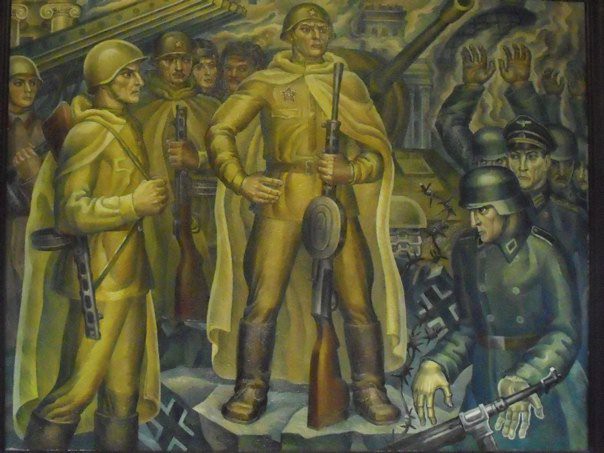
But in the same way Americans over-simplify the Soviet war effort, Russians overly idolize it. It has become their defining moment, the key to the myth of Russia’s status as a chosen nation, the eventual savior of the world. It is the secular, twentieth-century version of an old Russian Orthodox teaching that the resurrected Christ will appear not in the ancient holy land, but in Russia, there to uplift the Russian people, at last, in a final gesture that will give meaning to their endless suffering by making it redemptive. In his Victory Day speech last year in Moscow, Vladimir Putin said, with tears in his eyes, “Our fathers and grandfathers overcame a powerful, merciless enemy. It was the Soviet people who brought freedom to so many other peoples. It was when confronted with our soldiers that the Nazis were utterly defeated.” It is vitally important to this narrative that the Soviet Union singlehandedly defeated Hitler. The idea that it needed allies, or even desired them, undermines the story. “Allies” is still a dirty word in Russia when referring to the war; it is uttered only in irony. No country — save perhaps the United States — is so assured of its own exceptional status. And just as we are willing to overlook our founding fathers’ shortcomings and sugarcoat the shames of slavery and Indian removal, Russians too easily forget their own horrors.

Josef Stalin provides Russian nostalgia with its greatest obstacle. In reckoning with World War II’s atrocities, Germany has an advantage — if it can be called that — over Russia: Hitler’s villainy is not tempered by being on the right side of history. He was so clearly wicked, so vociferously wrongheaded that mainstream German culture has not struggled with whether or not to distance itself from his legacy. And he lost the war. The association of Stalin with Soviet victory over Nazism inoculates him in the same way that the New Deal helps us overlook Franklin Roosevelt’s Executive Order 9066, which put Japanese-Americans in prison camps.
Stalin’s monstrosity far exceeds Roosevelt’s, of course, but so do his successes: he took a backwards country, the one that Karl Marx thought would be the last in Europe to achieve Communism, and turned it into a superpower. In a country where millions hadn’t even transitioned from wood to coal for their stoves, he ordered electricity wired into every apartment, house, and mountainside shack in every city and Podunk town. He projected strength and power in a way that no Russian leader had since Peter the Great, though some have tried. Stalin is Russia’s Abraham Lincoln and their George Washington and more. But he is simultaneously the Soviet Union’s greatest shame, a worse criminal than any American can claim to be, the author of the greatest mass murder in human history.
Unlike Hitler, Stalin did not insist on documentation of his death camps, so we don’t know how many people he killed. Where Hitler’s genocide was obviously motivated by hatred of specific groups, the very enormity of Stalin lies in his lack of specific animus. Estimates of Stalin’s victim count have ranged from six million to sixty million. The margin of error alone is more than a quarter of their population; more than live in the Boston-Washington corridor today; 2% of the entire world’s population at the time. Even assuming the lowest estimate, this slow, nameless killing was comparable to the Holocaust. But without images, without a defined purpose, it can’t capture the imagination. Museums to the purges are small and obscure, not only because they have been actively discouraged by the Putin administration, but also because there is precious little to put in them. Without a record of its specifics, mass murder is too easily answered with a “yeah, but — .” The great killings under Stalin have become an object lesson in the power of narrative and in the impotence of a story without specific details.

Putin was born in 1952, a year before Stalin’s death. He grew up in Leningrad, which was still recovering from its nine-hundred-day siege, the deadliest battle in world history. Reminders of Hitler’s destruction were everywhere, even as the city rebuilt: uncleared rubble in courtyards, tales of starvation and cannibalism, and a shocking gender imbalance: for every 10 women aged 20–29 in 1946, there were only six men. But the 1950s and 1960s were generally good years: the nation crawled its way back to prosperity, Khrushchev loosened the grip of Stalin’s repressions, and Soviet scientists won the space race (don’t get Russians started on this one, either).
The young Putin evolved from what journalist Masha Gessen has called a “street tough” to a gosudarstvinik — a man of the state. He loved spy movies as a kid, so he joined the KGB after graduating from college. After keeping tabs on foreigners for five years in Leningrad, he spent the second half of the 1980s in the KGB office in gloomy East Germany, a representative of the empire that had risen from the ashes of World War II and now commanded an entire hemisphere. Suddenly, all that was taken away. The Berlin Wall fell, which was a bigger deal in the West than in the Soviet Union, but it forced Putin to flee. Then, at the stroke of midnight, as 1991 changed to 1992, the Soviet Union ceased to be. Russians found themselves in a new nation, the Russian Federation, which called itself a democracy and pronounced its allegiance to laissez-faire capitalism. But most importantly, it was impoverished and confused and humiliated. It didn’t have a Constitution, much less a robust national identity.
The rich, predictably, grew very rich, and the poor grew very poor. America claimed the old Soviet sphere of influence as its own, thank you very much. We cheered as the Baltic countries tore down their statues of Stalin and denied citizenship to Russian-speakers, then invited them to join NATO. In 1998, Latvia proclaimed March 16 an official remembrance day for the Latvian Legion of the Waffen-SS, a Nazi military unit (the official holiday was cancelled two years later, but the celebration persists). Barack Obama, in a 2014 speech in Tallinn, praised Estonians for holding onto democratic ideals “when the Red Army came in from the east and the Nazis came in from the west,” as if those things were equal.
The Baltic countries had plenty of valid complaints about Soviet rule, and they were right to align themselves with Europe and America after independence. But any suggestion that Russia should worry about NATO members — explicit geopolitical foes — on its border was met with suggestions to forget the past and embrace the future. When an increasingly impotent and inebriated Boris Yeltsin sold his nation out to a cabal of oligarchs in 1996, causing a crisis of confidence in democracy (Russians started calling it “dermokratia” — crapocracy), that was the cost of doing business. When anti-Russian movements arose in former Soviet nations, Russians were supposed to understand that their neighbors were no longer their concern, but America’s.
In 1954, when Putin was only two years old, Soviet premier Nikita Khrushchev gave the peninsula of Crimea to the Ukrainian Soviet Federated Socialist Republic in gratitude for the suffering of the Ukrainian people — outsized even by Soviet standards — under the Nazis. The gesture was mostly symbolic, since the Ukrainian S.F.S.R. was just one mini-state in the U.S.S.R. In March of 2014, Putin took Crimea back. Russians cheered. “Crimea is OURS!” read banners and bumper stickers. Cars lined up on the Russian Black Sea coast for days to take the ferry over to the peninsula and drive its twisty roads. In fairness, Crimea has never really felt Ukrainian. Crimea had not been subject to Ukraine’s language laws, which discouraged the printing of Russian in stores and restaurants. Even government buildings flew the Russian flag. There is no reason to believe that a large majority of Crimeans did not want to join the Russian Federation. The Ukrainians I spoke to in 2014 were angry about the encroachment in principle, but couldn’t really summon the disbelief or rage that Westerners wanted.
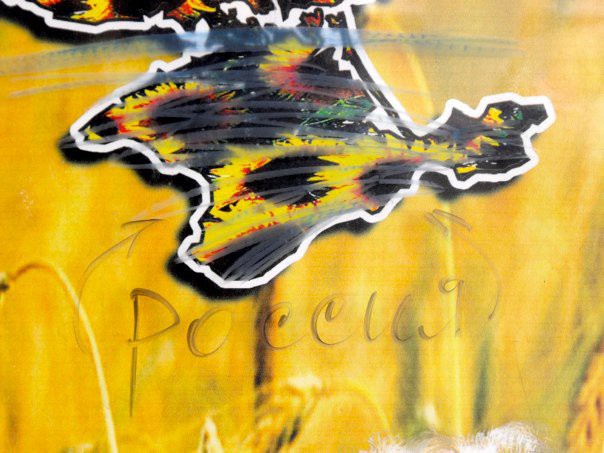
To us in the West, the annexation seemed unbelievable. It was so brazen, such a clear violation of Ukraine’s territorial sovereignty. And Crimea seemed an odd prize for Putin. The peninsula is impoverished. What commerce it has is mostly tied to tourism, and an invasion is unlikely to improve its desirability. Western journalists and politicians seemed baffled. Why Crimea? Why now? Four months before the annexation of Crimea, Ukrainians overthrew Viktor Yanukovich, their corrupt and venal albeit democratically elected president, and in early 2014, he fled to Russia. Headlines around the world proclaimed the end of Russian hegemony in Eastern Europe.
“Fascists! Nazis!” cried the Russians to anyone who would hear. Russian television news was filled with reports describing the rise of Nazism in Eastern Europe and comparing the baby-faced politicians of new Ukraine to SS officers. In the West, our news was crowded with images of freedom fighters struggling to get out from under Putin’s dictatorial regime and establish a true democracy. The Russian reaction, if we learned about it, seemed kind of funny, in a smirky way — how could they possibly think that these protesters were fascists? We smirked until Russian troops landed at Kerch in eastern Crimea.
From a Russian point of view, America’s privileged history has made us blind to the fascist menace. Some of us are starting to come around to that view, having watched the political developments of the last year or two, but even in the Trump era, none but the most alarmist of us really thinks that the president is an actual Nazi. But Russians take the term “Nazi” literally, and their reaction to it is based on the sustained presence of World War II in the national consciousness. The Ukrainian uprising was not fascist. If anything, the biggest problem was that it didn’t unseat enough of the old guard to truly change the nation’s path. But the Russian response was not simply paranoia or melodrama.
In August of 2014, I spent two weeks in northeastern Ukraine. Kyiv gleamed, scrubbed of the soot and shit and detritus of encampment and protest. Strung between the birch trees in front of parliament were banners: “Ukraine for Ukrainians!” “Slava Ukraini!” proclaimed massive billboards adorned with pictures of flowing wheat fields, “heroiam slava!” But the ubiquitous expression has sinister overtones to Russian ears: it was the slogan of Stepan Bandera’s private army of nationalists who fought alongside the Nazis in World War II.
Not that antipathy about the Soviet past is all sour grapes in Ukraine. Among other indignities, Stalin likely orchestrated the Holodomor, a man-made famine in Ukraine that claimed the lives of (unrecorded) millions. Ukrainian nationalists have made victimization by Stalin the defining fact of their nation’s modern history. This may seem natural, but it comes at the expense of whitewashing Nazi atrocities, a fact that the Russian media is quick to point out. If Crimea was given to Ukraine as thanks for aiding the fight against Hitler, then could it not be rescinded as punishment for turning back? Most Russians seem to think so.
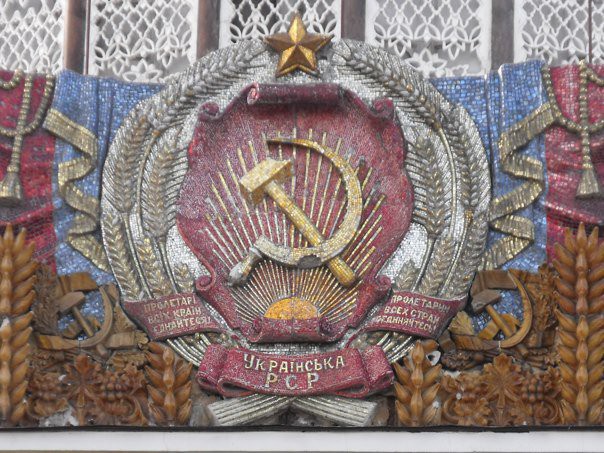
Putin’s approval ratings, which had been stagnant or even losing ground from 2008–2013, leapt to 80–85 percent after the annexation of Crimea. They have not fallen, even as the Russian economy has weakened. In the West, we tend to scoff at these numbers and disbelieve them, but a growing body of research suggests that these ratings are, in fact, true. Western polls of Russians show about the same levels of support, and no study has indicated that people are lying to pollsters. Most findings show the opposite: the outsized approval is very real. The independent Lavada Center found in a January 2017 poll that 43 percent of Russians reported being proud of “The Return of Crimea.” The only thing that elicited more universal feelings of pride was “Victory in the Great War for the Fatherland,” with 83 percent.
During the Cold War, the United States was as compelling an enemy for the Soviet Union as they were for us, but that era ended in 1991 (and, really, in the early 1980s). Who or what could replace us? Since the 1970s, Moscow has strived to make Islamic extremism into as effective a geopolitical foe as Nazi Germany was. Their war in Afghanistan — which was about as successful as our own and nearly as long — succeeded only in creating dissatisfaction. Lately, Putin has had some success making liberalism into the bogeyman, setting Russia up as a bastion of “traditional” values, opposed to the excesses of Western sin: moral relativism, secularism, and pederasty. But nothing has stuck quite like The Great War for the Fatherland, and the Ukraine uprising, with its overt echoes of Nazism and pro-Hitler guerillas, was just the thing to make Russians circle the wagons.

On April 20, 2017, in preparation for this year’s Victory Day celebrations, Putin spoke at the Kremlin Palace. He extolled the virtues of an “objective study of history,” then warned, “Unfortunately, there are, of course, other ways of approaching history. There are those who try to turn it into a political or ideological weapon.” He continued, “there is an especially dangerous path, taken by certain countries, to valorize Nazism and vindicate Nazi collaborators.” He clearly meant this as a criticism of Ukraine, but then he broadened this focus: “Historical revisionism opens the way to second-guessing the foundations of our contemporary world order and the erosion of the key principles of international law and security, which evolved out of the reckoning of World War II.” That reckoning, of course, created the bi-polar world of the Cold War — when the Soviet Union laid claim not only to Ukraine, but to Syria and others, and when the “greatness” of Putin’s homeland was not in doubt.
In March 2017, The Lavada Center announced that the percent of Russians who proclaimed interest in World War II had fallen from 55 percent to 38 percent in nine years. Statistics like this, often released just before Victory Day, prompt a flurry of hand-wringing. Are kids not learning about the war in school? Is Western propaganda shaping the narrative? Is it because the generation that remembers the war is almost gone? Because kids are too busy on their phones to care about history or sacrifice or what makes them Russian?
These concerns are not just “kids these days” worries; they presume a national identity that is both fragile and rooted firmly not just in the past, but in a particular reading of a single moment in history. As time passes, so too does the immediacy of historical memory. The meaning of victory over the Nazis is, of course, just one facet of the mythically enigmatic Russian identity. But it is at once the most easily identifiable trait of Russian-ness and also the trait that seems most immediately at risk of falling prey to revisionism or “PC culture” or apathy. This part of the Russian self cannot long survive in a changing, globalizing world — a world in which Russian youth, especially in the western regions that hold 77 percent of the population, feel increasingly European and less like inheritors of a great Soviet legacy.
Russian history is a continual cycle of shopping for an identity. A thousand years ago, Vladimir the Great couldn’t decide which religion to adopt, so he sent envoys to the Muslims, Jews, and Christians. When they reported back, the story goes, Vladimir chose Christianity because it allowed both pork and alcohol, and “drinking is the joy of all Rus.” Aristocratic Russians in the 18th century often did not speak their native tongue fluently, preferring to converse in French. If the victory of Nazi Germany fades from its central role in the minds of the new, Europeanized, globalized Russian generation, Russia will adapt. It always has. For now, though, the Kremlin anticipates the biggest, splashiest Victory Day ever. Russians will sing “Victory Day” in the streets till sunrise and after. Tanks and missiles will trundle across Red Square. The Great War for the Fatherland will continue to define the identity of the largest nation in the world.
Matthew Van Meter is an author and lives in Detroit. He is currently at work on a book about a landmark Supreme Court case from the 1960s.
